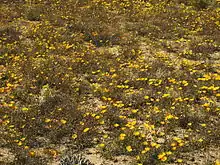Dimorphotheca sinuata
Dimorphotheca sinuata, the glandular Cape marigold,[2] Namaqualand daisy,[3] or orange Namaqualand daisy;[4] syn. Dimorphotheca aurantiaca hort.[5]) is an African species of plants native to southern Africa. It is also widely cultivated as an ornamental and naturalized in parts of the United States, primarily California and Arizona.[6][7]
| Dimorphotheca sinuata | |
|---|---|
 | |
| Scientific classification | |
| Kingdom: | |
| (unranked): | |
| (unranked): | |
| (unranked): | |
| Order: | |
| Family: | |
| Genus: | |
| Species: | D. sinuata |
| Binomial name | |
| Dimorphotheca sinuata | |
| Synonyms[1] | |
|
Synonymy
| |
Dimorphotheca sinuata grows in western South Africa and in Namibia, very often in places receiving winter rainfall but also in sandy deserts.[8] It flowers early in spring. It is an annual sometimes exceeding 30 cm (12 inches) in height. Flower heads are generally yellow or orange with purple markings, containing both ray florets and disc florets.[9][10]
References
- The Plant List, Dimorphotheca sinuata DC.
- "Dimorphotheca sinuata". Natural Resources Conservation Service PLANTS Database. USDA. Retrieved 18 January 2016.
- "BSBI List 2007". Botanical Society of Britain and Ireland. Archived from the original (xls) on 2015-01-25. Retrieved 2014-10-17.
- "D. sinuata at Iziko Museums of Cape Town". Archived from the original on 2007-07-15. Retrieved 2007-03-30.
- "Dimorphotheca sinuata". Germplasm Resources Information Network (GRIN). Agricultural Research Service (ARS), United States Department of Agriculture (USDA). Retrieved 14 January 2018.
- Biota of North America Program 2014 county distribution map
- Calflora taxon report, University of California, Dimorphotheca sinuata DC., African daisy, Cape marigold, glandular cape marigold
- PlantZAfrica.com: Dimorphotheca sinuata
- Flora of North America, Dimorphotheca sinuata de Candolle in A. P. de Candolle and A. L. P. P. de Candolle, Prodr. 6: 72. 1838.
- Gibbs Russell, G. E., W. G. M. Welman, E. Retief, K. L. Immelman, G. Germishuizen, B. J. Pienaar, M. Van Wyk & A. Nicholas. 1987. List of species of southern African plants. Memoirs of the Botanical Survey of South Africa 2(1–2): 1–152(pt. 1), 1–270(pt. 2).
This article is issued from Wikipedia. The text is licensed under Creative Commons - Attribution - Sharealike. Additional terms may apply for the media files.